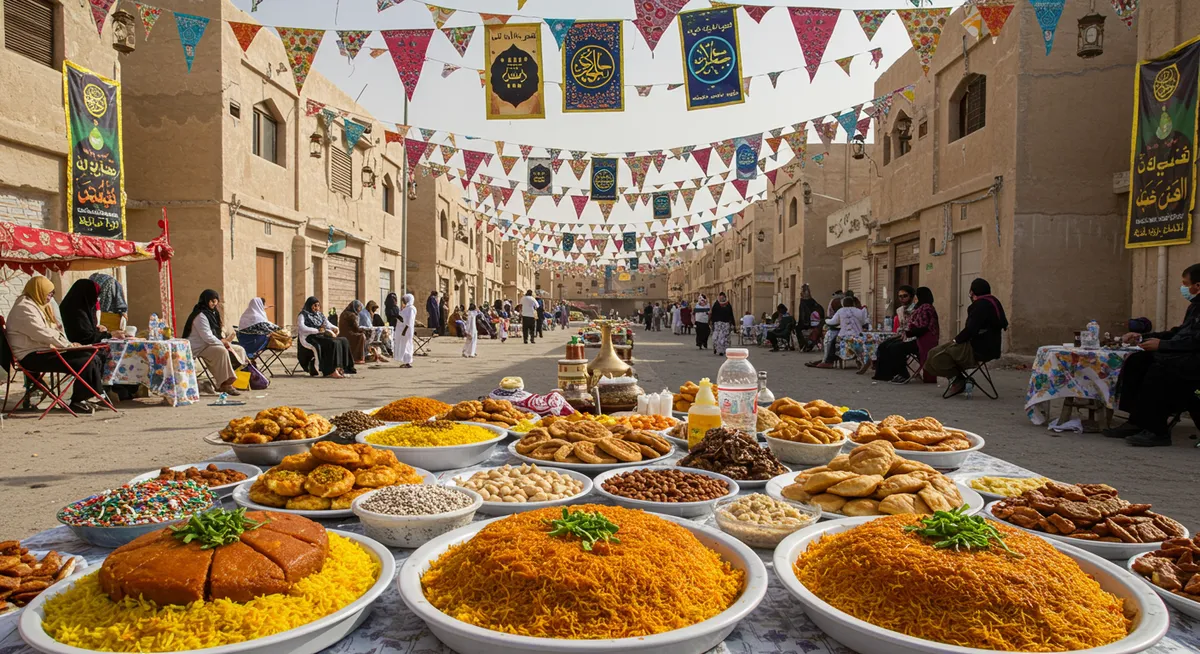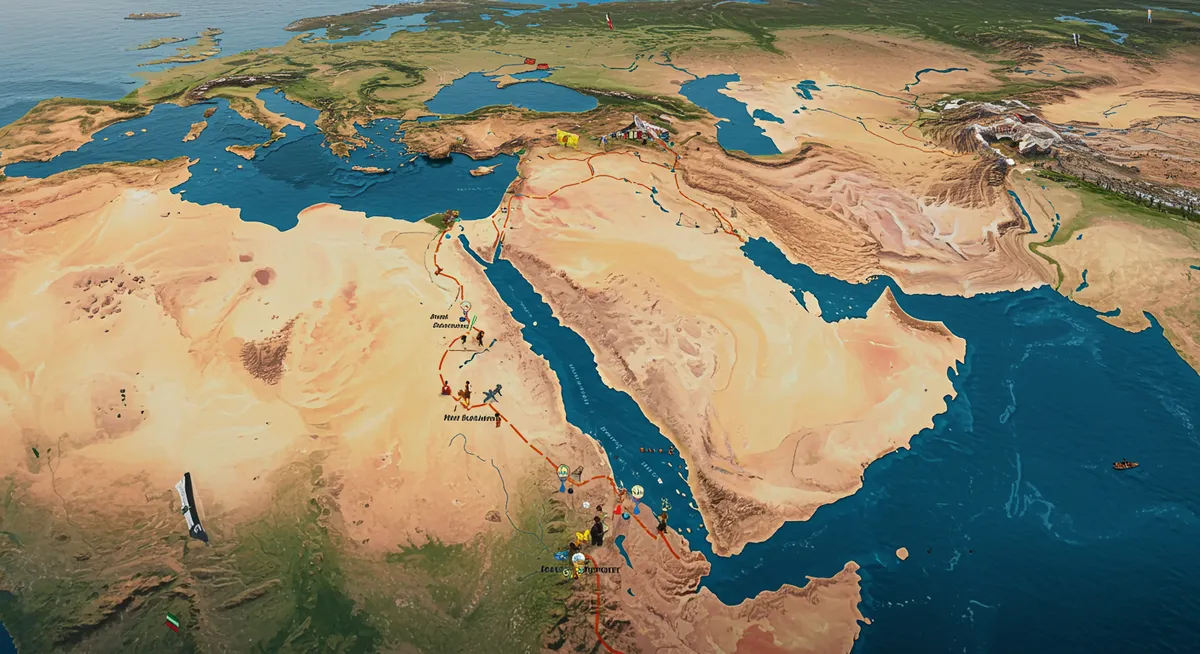Middle Eastern Cultural Festivals Guide | Ancient Traditions & Celebrations

Middle Eastern Cultural Festivals: Ancient Traditions and Spiritual Celebrations
The Middle East's festival landscape represents one of the world's most extraordinary living connections to ancient cultural traditions. From centuries-old religious ceremonies to vibrant seasonal celebrations, the region offers travelers unique opportunities to experience cultures where spirituality, hospitality, and community celebration remain powerfully interconnected. Spanning diverse countries from Morocco to Iran, this guide explores the most significant cultural festivals across the Middle East's different regions, providing context and practical information for authentic cultural immersion experiences.

The Rich Cultural Foundations of Middle Eastern Festivals
Middle Eastern festivals emerge from several foundational influences that have shaped the region's distinctive cultural expressions:
- Ancient Civilizations: Many celebrations have roots in Mesopotamian, Persian, Egyptian, and other ancient civilizations dating back thousands of years
- Religious Traditions: Islamic, Christian, Jewish, Zoroastrian, and other spiritual traditions have created distinctive festival expressions
- Seasonal and Agricultural Cycles: Many celebrations mark important seasonal transitions in this historically agricultural region
- Cultural Crossroads: As a meeting point between continents, Middle Eastern festivals reflect diverse cultural influences
Major Middle Eastern Festival Categories
Middle Eastern festivals can be broadly categorized to help travelers find experiences that match their interests:
Islamic Religious Celebrations
Islamic festivals form the cornerstone of cultural celebrations across much of the region:
- Eid al-Fitr: The celebration marking the end of Ramadan features distinctive regional customs from Morocco to Iran
- Eid al-Adha: The Feast of Sacrifice honoring Ibrahim's willingness to sacrifice his son combines religious observance with community festivities
- Mawlid al-Nabi: The Prophet Muhammad's birthday features unique regional expressions including processions, special foods, and community gatherings
- Ashura: Commemorations marking the martyrdom of Imam Hussein hold particular significance for Shia communities across the region

Ancient and Pre-Islamic Celebrations
Festivals with roots in ancient civilizations continue alongside religious traditions:
- Nowruz: Persian New Year celebrations marking the spring equinox feature distinctive customs from Iran to Kurdistan and Central Asia
- Sham el-Nessim: Egypt's pharaonic spring festival has continued for thousands of years across religious changes
- Mehregan: Ancient Persian autumn festival honoring friendship, affection, and love
- Yalda Night: Iranian winter solstice celebration featuring poetry, fruits, and family gatherings
Regional and Ethnic Traditional Festivals
Distinctive local cultural traditions are preserved through unique celebrations:
- Berber Festivals: North African indigenous celebrations with distinctive music, dance, and cultural traditions
- Kurdish Newroz: New Year celebrations with specific cultural and political significance
- Bedouin Gatherings: Desert traditions celebrating tribal heritage and nomadic culture
- Nubian Festivals: Distinctive celebrations of this ancient African civilization along the Nile
Contemporary Cultural Festivals
Modern Middle Eastern countries have developed vibrant new festival traditions:
- Arts and Film Festivals: From Dubai International Film Festival to Jordan's Jerash Festival for Culture and Arts
- Food Celebrations: Culinary festivals celebrating the region's extraordinary gastronomic heritage
- Heritage Revivals: Events designed to preserve and showcase traditional crafts, music, and cultural practices
- Contemporary Music Gatherings: From traditional instruments to modern fusion performances
Middle Eastern Festival Regions
Middle Eastern festivals reflect distinct regional characters shaped by geography, history, and cultural influences:
Levant (Eastern Mediterranean)
Lebanon, Syria, Jordan, Palestine, and Israel blend ancient Mediterranean traditions with diverse religious influences:
- Lebanon's Baalbeck International Festival: Cultural performances against the backdrop of ancient Roman temples
- Jerusalem's Sacred Celebrations: Religious festivals of three major faiths in the historic Old City
- Jordan's Jerash Festival: Contemporary cultural celebrations in a remarkably preserved Roman city
- Palestinian Traditional Ceremonies: Olive harvest celebrations and cultural heritage festivals
Arabian Peninsula
Saudi Arabia, UAE, Qatar, Bahrain, Kuwait, Oman, and Yemen preserve distinctive Gulf traditions:
- Saudi Arabia's Janadriyah Festival: National heritage and culture festival showcasing regional traditions
- UAE's Heritage Festivals: From Dubai Shopping Festival to Abu Dhabi's traditional celebrations
- Oman's Muscat Festival: Month-long celebration of Omani culture, heritage, and contemporary life
- Qatar's Traditional Dhow Festival: Maritime heritage celebration of traditional pearl diving and fishing
North Africa / Maghreb
Morocco, Tunisia, Algeria, and Libya blend Arab, Berber, Mediterranean, and African influences:
- Morocco's Fes Festival of World Sacred Music: Gathering of spiritual musical traditions from across the globe
- Tunisia's International Festival of the Sahara: Celebration of desert culture and traditions
- Algeria's Berber New Year: Yennayer celebrations marking indigenous cultural heritage
- Morocco's Moussem Festivals: Traditional saint's day pilgrimages combining spiritual and cultural significance

Egypt and Sudan
The Nile Valley preserves some of the world's oldest continuous festival traditions:
- Egypt's Sham el-Nessim: Pharaonic spring festival celebrated by all Egyptians regardless of religion
- Abu Simbel Sun Festival: Biannual phenomenon where sunlight illuminates specific temple statues
- Moulid Celebrations: Egyptian Sufi festivals honoring saints and spiritual leaders
- Nubian Cultural Festivals: Celebrations of this ancient African civilization along the Nile
Iran and Persian Cultural Sphere
Iran preserves ancient Zoroastrian and Persian traditions alongside Islamic celebrations:
- Nowruz: Elaborate New Year celebrations with distinctive customs and traditions
- Chaharshanbe Suri: Fire-jumping ceremony held on the last Wednesday before Nowruz
- Yalda Night: Winter solstice celebration featuring poetry readings and family gatherings
- Ashura Commemorations: Distinctive Shia observances with particular importance in Iran
Turkey and Anatolia
Turkey bridges European and Middle Eastern cultural traditions:
- Nevruz Spring Celebrations: Marking new year with distinctive Turkish and Kurdish traditions
- Kirkpinar Oil Wrestling Festival: Centuries-old tournament celebrating traditional Turkish wrestling
- Mesir Macunu Festival: 500-year-old tradition distributing paste from mosque domes in Manisa
- Istanbul International Music Festival: Modern celebration in a city spanning continents and civilizations
Planning Your Middle Eastern Festival Journey
Creating a memorable Middle Eastern festival experience requires thoughtful planning:
Seasonal and Calendar Considerations
Middle Eastern festivals follow specific calendars that should guide your travel planning:
- Islamic Lunar Calendar: Many major festivals follow the lunar calendar, changing dates each solar year
- Ancient Solar Calendars: Persian and other pre-Islamic celebrations often follow solar or agricultural timing
- Climate Factors: Consider regional temperature extremes when planning festival visits
- Ramadan Travel: Understand how this major month of fasting affects festival scheduling and daily rhythms
Regional Festival Routes
Maximize your cultural experiences by planning itineraries around festival clusters:
- North African Heritage Route: Connect Moroccan, Tunisian, and Egyptian traditional celebrations
- Persian Cultural Circuit: Experience Iran's extraordinary calendar of ancient and religious festivals
- Levantine Sacred Journey: Witness religious celebrations across multiple faiths in this historically diverse region
- Gulf Heritage Experience: Connect traditional festivals across the Arabian Peninsula
Practical Travel Considerations
Successful festival travel in the Middle East requires attention to practical details:
- Cultural Sensitivity: Research appropriate dress and behavior, particularly for religious festivals
- Advance Planning: Some festivals may require special permissions or arrangements
- Gender Considerations: Some celebrations may have gender-specific areas or customs
- Photography Guidelines: Understand when and where photography is appropriate
- Regional Travel Logistics: Plan for transportation between destinations, which may be affected during major festivals

Cultural Sensitivity at Middle Eastern Festivals
Many Middle Eastern festivals have deep spiritual and community significance requiring respectful participation:
- Religious Respect: Learn appropriate behavior for Islamic, Christian, Jewish, and other religious celebrations
- Modest Dress: Research regional expectations for appropriate clothing at different festivals
- Fasting Awareness: During Ramadan and other fasting periods, be mindful of eating, drinking, and smoking in public
- Gender Customs: Understand gender-specific areas and traditions in more conservative regions
- Photography Etiquette: Always seek permission before photographing individuals, particularly at religious events
Middle Eastern Festival Highlights Calendar
While many Middle Eastern festivals follow religious calendars with changing dates, this general timeline provides an overview:
- January: Orthodox Christmas (Jerusalem), Winter festivals in Gulf states
- February/March: Kuwait National Day celebrations, Spring festivals
- March: Nowruz (Persian New Year) across Iran and Kurdish regions, Sham el-Nessim preparations
- April: Sham el-Nessim (Egypt), Spring heritage festivals across the region
- May: Ramadan begins (varies by lunar calendar), Gnaoua World Music Festival (Morocco)
- June: Eid al-Fitr (varies by lunar calendar), Summer festival season begins
- July: Jerash Festival (Jordan), Baalbeck International Festival (Lebanon)
- August: Summer cultural festivals, Regional date harvest celebrations
- September: Eid al-Adha (varies by lunar calendar), Autumn harvest celebrations begin
- October: Islamic New Year (varies by lunar calendar), Fall cultural festivals
- November: Mawlid al-Nabi (varies by lunar calendar), Autumn cultural events
- December: Winter solstice celebrations, Yalda Night (Iran), Regional Christmas celebrations
Experience the Middle East's Living Heritage
Middle Eastern festivals offer travelers extraordinary opportunities to witness traditions that have shaped global civilization for thousands of years. Whether you're drawn to the spiritual depth of Islamic celebrations, the ancient echoes of pre-Islamic festivals, the distinctive expressions of regional cultures, or the vibrant contemporary arts events, there's a celebration that will transform your understanding of this extraordinarily rich cultural crossroads.
By approaching these celebrations with respectful curiosity and cultural awareness, you'll discover that Middle Eastern festivals provide some of the most profound and hospitable cultural experiences available anywhere in the world. The region's unique blend of ancient tradition and warm hospitality creates festival experiences where travelers are often welcomed as honored guests into celebrations that have continued unbroken for centuries or even millennia.
Ready to experience Middle Eastern festivals?
Explore our detailed guides to specific Middle Eastern celebrations and start planning your cultural festival journey.
Check back soon for our upcoming spotlights on iconic Middle Eastern festivals including Nowruz, Eid celebrations, and ancient Egyptian traditions.